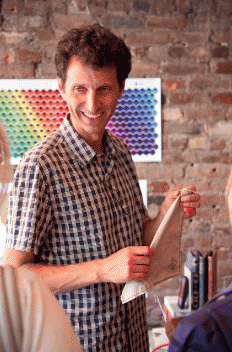My guest today is David Bolotsky, Founder and CEO of UncommonGoods, an online marketplace.
JB: Welcome to OpEdNews, David. What makes this enterprise stand out?
DB: UncommonGoods offers creative products from independent artists and designers at affordable prices and we do it with a focus on sustainability. We're independently owned and operated, which means we can run the business for the long term and make decisions that are consistent with our values.
We run the entire company out of Brooklyn, including a warehouse where the lowest-paid seasonal worker starts at 50% above the minimum wage. Half of what we sell is handmade, half is made here in the US and about one-third is made from recycled materials. And we don't sell any products that contain leather or involve killing animals.
JB: I love it! Where did the concept for UncommonGoods come from? What precipitated it?
DB: I was a research analyst studying the retail industry in the 1980s and "90s. I learned about the Internet from a grad student friend when it was entirely text based and he used it to find an endless supply of jokes. It was the most exciting technological development I had seen in my life and when it became clear that there was an opportunity to sell product through it, I was hooked.
I researched Internet retailing as part of my job, including working on the eBay IPO, and quickly came to the conclusion that I'd rather be running a business than writing about one. I visited a Smithsonian Museum craft show in Washington D.C. as part of my research on various opportunities and saw a market that was ideally suited for the web.
You had sellers that were travelling from as far away as California, incurring travel expense for themselves and their work, while being away from family and friends on the weekend. You had shoppers that were looking for something special, that expressed their individuality, something they couldn't find at the mall. I realized that this presented a great opportunity to put all this product under one virtual roof, available on everyone's desktop 24/7.
JB: So, how did you jump in? What kinds of items were among your first offerings? And how did it go?
DB: I started the business out of my apartment on the Lower East Side of Manhattan and worked to pull together a team and raise some money. In 1999, the money was easy to come by and we grew quickly, reaching 35 team members by early 2000. Unfortunately, the Internet bubble burst that spring and we were forced to reduce our staff to 5 of us, as we were running low on cash. As a result of that experience, we've taken a more conservative approach to our growth. While sales have grown every year, we've chosen not to take outside money for the past 10 years and have expanded the business in a more sustainable manner.
We started out by going to craft fairs and trade shows and found a lot of great products. One of my early favorites was a bottle opener made from a recycled bicycle chain, an item we sell to this day. It was very tough going in the beginning, as many people were still not online and we did not have the money for a large advertising budget. In 2001, we decided to test a catalog and found that it was a very effective way to both sell product and drive people to our website.
JB: UncommonGoods is also a founding member of B Corporation. What is it and how did you get involved with it?
DB: B Corporations are companies that meet a standard for sustainability, which incorporates the impact on people (workers, customers and the community) and the environment, in addition to profits. Since starting UncommonGoods, I had sought to have a positive impact with the business, but did not have a yardstick to measure against.
I was talking to Steve Voigt, the CEO of King Arthur Flour, in 2006 about this issue and he told me about this new standard that was launching the next year. We went through the evaluation process and learned a great deal about both what we did well and the many ways we could improve.
(Note: You can view every article as one long page if you sign up as an Advocate Member, or higher).






